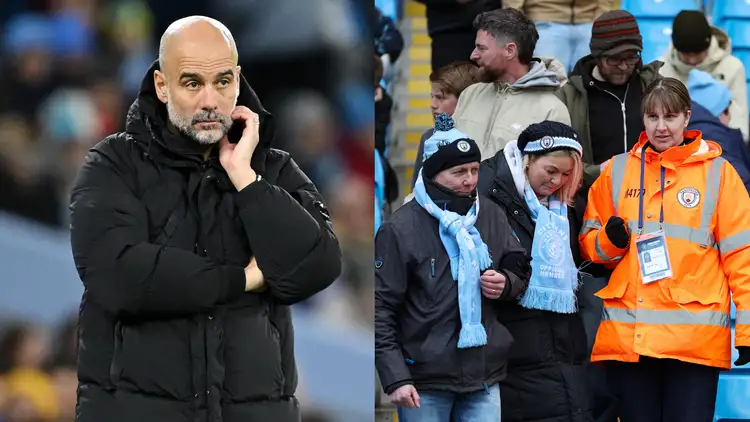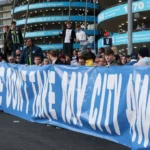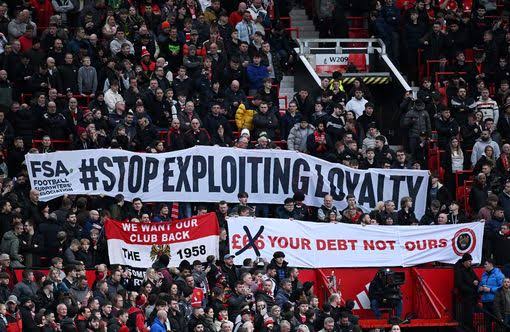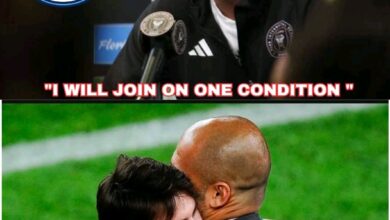Man City facing mutiny! Nine-minute protest planned over club’s controversial partnership which has caused ‘distrust

On March 29, 2025, Manchester City Football Club (Man City) found itself embroiled in a major controversy regarding its newly announced partnership with the third-party ticket agency, Viagogo. The deal has ignited widespread anger among fans, who feel the agreement undermines the integrity of ticket distribution, exacerbates safety concerns, and creates an atmosphere of distrust between the club and its loyal supporters. As a result, fan groups have called for a nine-minute protest during Manchester City’s upcoming Premier League match against Leicester City, scheduled to take place at the Etihad Stadium. This article explores the background of this protest, the reasons behind the fan backlash, and the broader implications of the deal for both the club and its supporters.
The root of the issue lies in Manchester City’s partnership with Viagogo, a ticket resale platform that has long been the subject of criticism within the football community. Viagogo operates as a secondary ticket market, allowing individuals to resell tickets to matches, often at inflated prices. While this business model has drawn significant opposition from fans and even regulatory bodies in the past, the decision by Manchester City to form a partnership with the company has sparked intense backlash from the club’s fanbase.
At the core of the dissatisfaction is the fear that this deal will exacerbate existing issues regarding the distribution of match tickets. Fans are particularly concerned that the deal will further prevent loyal City supporters from obtaining tickets to matches at face value, as third-party platforms like Viagogo are often used by resellers who drive up prices. This has led to accusations that the club is prioritizing profit over the interests of its supporters, potentially pricing out genuine fans from attending games and negatively impacting the overall atmosphere at the stadium.
In response to the announcement of the Viagogo partnership, several prominent fan groups, including 1894, Trade Union Blues, and the Manchester City Fans’ Foodbank, have organized a protest to take place during the upcoming match against Leicester City. The protest is planned to last for nine minutes, during which time fans are encouraged to remain in their seats and not engage with the match, symbolizing their opposition to the controversial deal.
The number nine holds particular significance for City fans, representing a form of solidarity and resistance against what they perceive as an exploitative decision by the club’s management. By staging the protest at the start of the match, these groups hope to send a strong message to the club’s hierarchy that their actions are being closely scrutinized and that they will not stand by while decisions are made that undermine the integrity of the fan experience.
Beyond the immediate protest, the backlash against Manchester City’s deal with Viagogo reflects deeper concerns about the future of fan engagement in modern football. In recent years, there has been growing anxiety among supporters about the increasing commercialization of the sport and its impact on the matchday experience. The proliferation of third-party ticketing platforms like Viagogo has only amplified these fears, as they are seen as contributors to rising ticket prices, a lack of transparency in ticket distribution, and a diminishing sense of community among fans.
One of the central issues raised by City fans is the negative effect that third-party ticketing can have on the atmosphere inside the stadium. When tickets are sold to individuals who are not regular supporters of the club, it can lead to a less passionate and engaged crowd. This, in turn, detracts from the electric atmosphere that has become a hallmark of Manchester City’s home games in recent years. Fans fear that the deal with Viagogo could lead to an influx of casual spectators, further diluting the club’s fan culture.
Moreover, safety concerns have also been highlighted in the wake of the Viagogo deal. Supporters argue that when tickets are sold through third-party platforms, there is a greater likelihood that opposing fans or individuals who do not have a genuine connection to the club may gain access to home matches. This increases the potential for disturbances and confrontations within the stadium, as well as complicating security protocols. Given the heightened importance of safety at football matches, particularly in an era of rising tensions and incidents of violence, the risks associated with third-party ticketing cannot be ignored.
In a collective statement issued by fan groups such as 1894, Trade Union Blues, and the MCFC Fans’ Foodbank, the dissatisfaction with the Viagogo deal is made abundantly clear. The statement reads, “We’ve seen record numbers of away fans in home and away ends, many of which have used third-party agencies to obtain tickets at inflated prices. This has caused safety issues and distrust amongst supporters who are unwilling to use the club’s Ticket Exchange due to fears about where their ticket will end up. Yet another ticket partner may only add to this.”
The fan groups specifically highlight the increase in the number of away fans seated in the home section of the Etihad Stadium, a situation that is exacerbated by the proliferation of third-party ticket sales. This has led to concerns that Manchester City’s loyal fans are being priced out of attending matches, while those seeking to profit from reselling tickets have been given greater access to coveted seats. As a result, there is a palpable sense of frustration among supporters, who feel increasingly disconnected from the club they have long supported.
The Football Supporters’ Association (FSA), which represents the interests of fans across the United Kingdom, has also weighed in on the issue, expressing its concerns about the growing influence of third-party ticketing platforms in football. In a statement, the FSA questioned the need for clubs to partner with companies like Viagogo, emphasizing that many clubs already run in-house ticket resale platforms that allow fans to exchange tickets at face value. The statement reads, “Plenty of clubs run their own in-house ticket resale platforms allowing supporters to pass on tickets to one another at face value. Why does any club need to engage a third-party company whose only reason for existence is to push up prices and profit from matchgoers? It feels instinctively unfair for clubs to penalize supporters for passing on tickets at face value to friends or family members while cosying up to these companies.”
This criticism reflects the broader sentiment that third-party ticketing companies, such as Viagogo, are primarily motivated by profit rather than the welfare of supporters. By engaging with such companies, clubs like Manchester City risk alienating their fanbase and reinforcing the perception that financial considerations are being prioritized over fan loyalty and community values.
The backlash against Manchester City’s partnership with Viagogo has the potential to damage the club’s image, especially among its most passionate supporters. The club’s reputation has long been built on its connection to the local community and its commitment to its fans. However, the controversial ticketing deal raises questions about the extent to which the club is willing to prioritize commercial interests over its relationship with supporters.
While Manchester City’s management may view the partnership with Viagogo as a necessary step to increase revenue and streamline ticketing operations, the fallout from this decision suggests that it could be a short-sighted move. The growing dissatisfaction among fans, as well as the planned protest during the Leicester City match, signals that the club may need to reconsider its approach to ticketing and fan engagement in order to rebuild trust and ensure that the voices of its supporters are heard.
In the coming weeks, Manchester City will likely face increased scrutiny over its partnership with Viagogo, particularly if the protest during the Leicester City match garners significant attention. While the club may stand by its decision in the short term, it is clear that the current situation has created a rift between the club’s management and its fans. The growing discontent suggests that Manchester City may need to engage in a dialogue with its supporters to address their concerns and find a more equitable solution to the ticketing issue.
Ultimately, the controversy surrounding the Viagogo deal is part of a larger trend in football, where commercial interests are increasingly at odds with the values of fan loyalty and community. As the sport continues to evolve, it remains to be seen how clubs will balance the need for financial success with the desire to maintain strong and genuine connections with their supporters.
The ongoing protest against Manchester City’s partnership with Viagogo is a powerful reminder of the growing tension between commercial interests and fan culture in modern football. As fans take a stand against what they perceive as an exploitative ticketing deal, the club must carefully consider the long-term impact of its decisions on its relationship with supporters. In an era where football is increasingly driven by financial considerations, it is crucial that clubs remember the importance of maintaining trust, transparency, and community ties with the people who form the heart and soul of the game.















